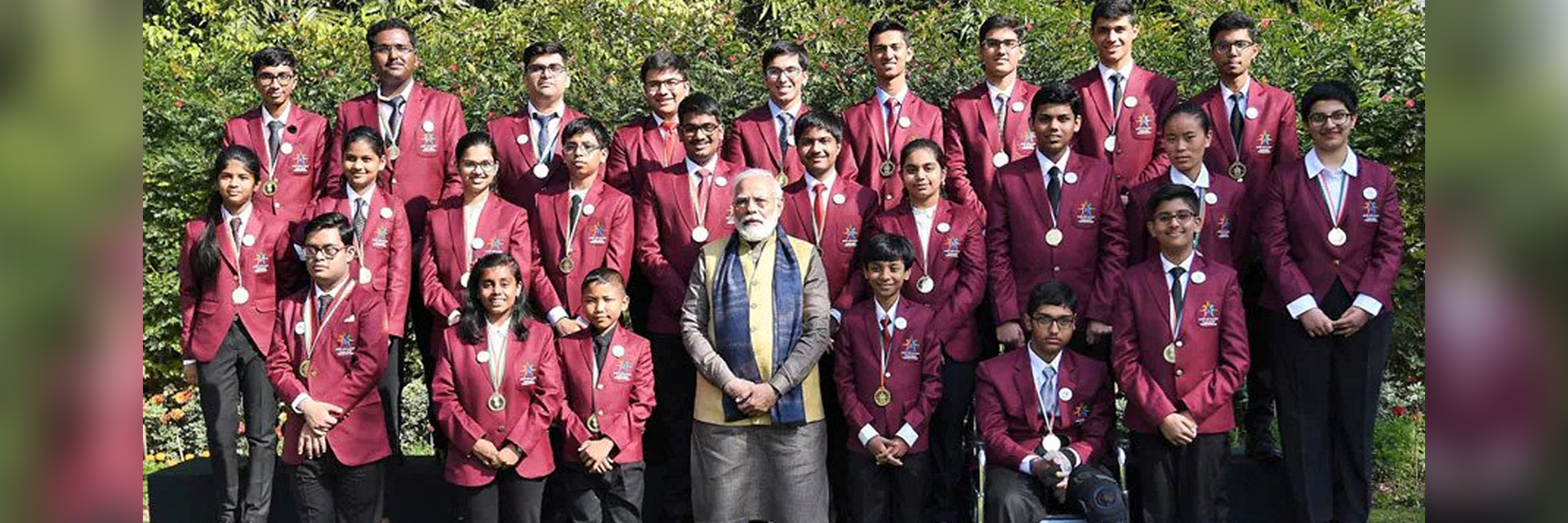(February 11, 2022) These young achievers stepped up in the darkest times, helping society find relief during an unprecedented lockdown. They reached out to other children in need. The Bal Puraskar winners are in the limelight today, and are inspiring other pint-sized thinkers to address world issues.
Holding his mother’s hand and clutching an outsized bouquet, eight-year-old Pal Sakshi stepped out of the district magistrate’s office, into a sea of cameramen outside. Despite the media attention, Sakshi’s concerns were more pragmatic – as they walked through the crowd, he asked his mother where he could keep his bouquet at home. The eight-year-old prodigy, also a keen volunteer with the Swachh Bharat Mission, is one of four recipients of the Rashtriya Bal Puraskar 2022. As the country battled the pandemic, trying to survive the lockdowns in safety, Sakshi began conducting musical performances online for charity, sending the proceeds to the PM Cares Fund. That’s not all, the pre-teen whiz kid even developed an app to create awareness about Covid-19, listing various ways to stay safe. These efforts cannot be allowed to go in vain. and while the award ceremony was cancelled last year, the awardees were given a digital certificate, using blockchain technology created by the government for the purpose.
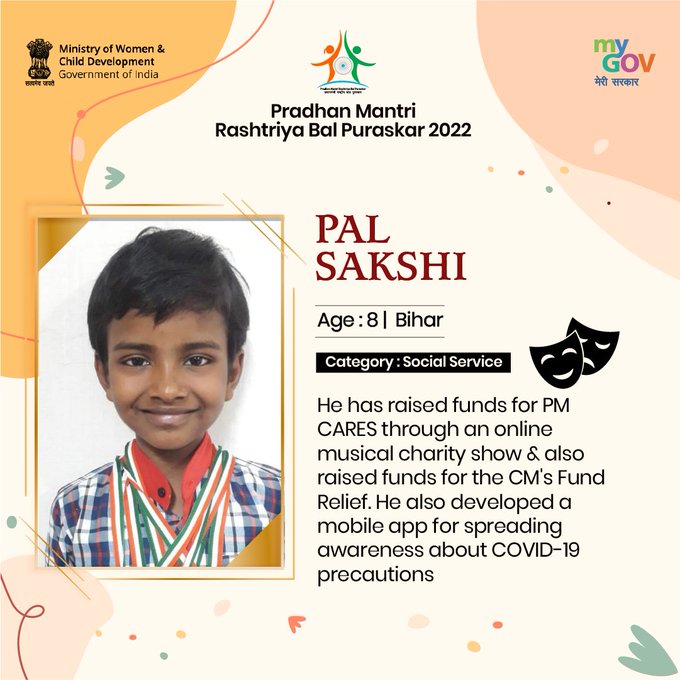
Shaping young entrepreneurs
As Bal Puraskar awardees dominate the public discourse, Prime Minister Narendra Modi has even remarked, “While talking to you, I feel that the Indian government’s efforts over the past few years to create jobs are having an impact. We have been promoting the idea of entrepreneurship in young people so they can make the nation stronger.” These words were said to 11-year-old Meedhansh, as he received his award at the local district administrative complex. When the Janta Curfew was imposed in March 2020, Meedhansh launched a website, working tirelessly to post information on his online platform. He even started a medical helping service and has participated in the state-level corona prevention project, Mission Fateh, launched by a former CM of Punjab. He was also awarded by the government of Punjab for developing Mission Fateh’s IT portal.
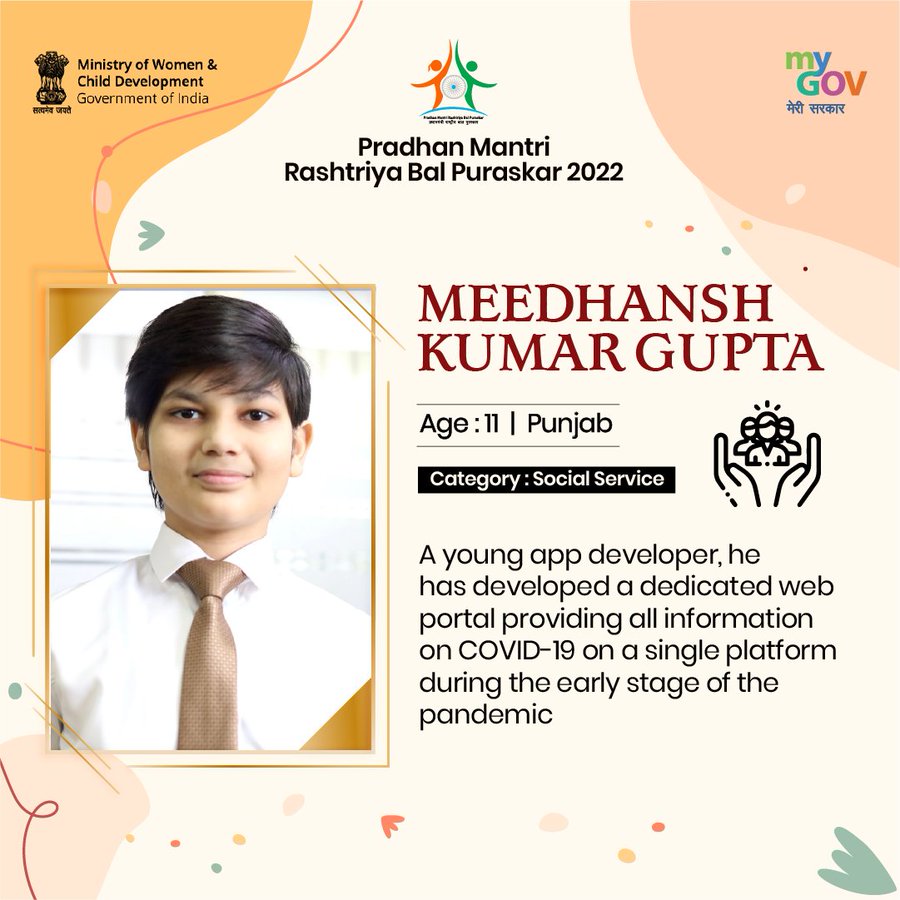

A solution to pandemic woes
The four young recipients are, undoubtedly, a powerhouse of talent. And each has tried to utilise those abilities towards making the world a better place. Through his portal, karnalcovid.in, 17-year-old Aakarsh Kaushal helped people in his district find access to real-time data regarding cases, deaths and RT-PCR test reports. Moved by what he saw during the pandemic, Aakarsh, always a passionate coder, decided to create the portal, which has had over 2,00,000 visitors. “Around the same number of RT PCR reports have been sent to patients directly on phones,” he posted on Facebook. He also created a portal to track the availability of beds in Karnal district, where the situation had grown dire. In the end, the initiative came to the authorities’ aid too, especially as it became a credible source of information.
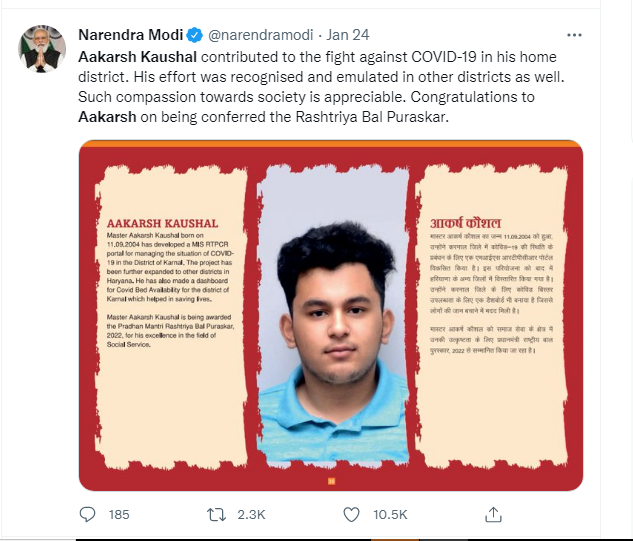

Timely recognition can go a long way. Prasiddhi Singh, the 2021 awardee for social welfare, feels, “The award gave me recognition, and also a sense of responsibility towards society and the planet. To me, awards are not the destination but the motivation to achieve more.”
Driven to do more
Far from being driven to complacency, with recognition so early in life, these youngsters are even more driven. Prasiddhi is working on her latest mission, to plant one lakh trees by the end of 2022. Describing the Pradhan Mantri Rashtriya Bal Puraskar as a “catalyst,” she says, “My mission to plant one lakh trees by the end of 2022 is almost complete, and I hope to accomplish the milestone with everybody’s support.”
It’s the “magic mantra,” avers Anjali Razdan, director, academics, Meluha International School, Hyderabad. “Whether it is in a child or an adult, being recognised generates lifelong motivation. The appreciation coming from the Prime Minister will go a long way in shaping their character, building patriotic sensibilities and a liberated mindset, all ingredients for inculcating good citizenship.”
Visionaries beyond their years
Sixteen-year-old Abhinav was described as “wise” by the Prime Minister on Twitter. “Reading is among the greatest joys in our society. The wise Abhinav is using technology to popularise books and has helped many youngsters,” he tweeted. During the lockdowns, Abhinav helped 10,000 underprivileged children who couldn’t afford new books, by arranging second-hand copies through an online store, Cruise Books, designed for the purpose. He helped the reselling of some 30,000 books, and in the process, did the planet a good turn too. “I helped save around 19,000 trees,” he told the PM. His web store even provides low-cost printing services all over India, making it easy to sell and collect used books.
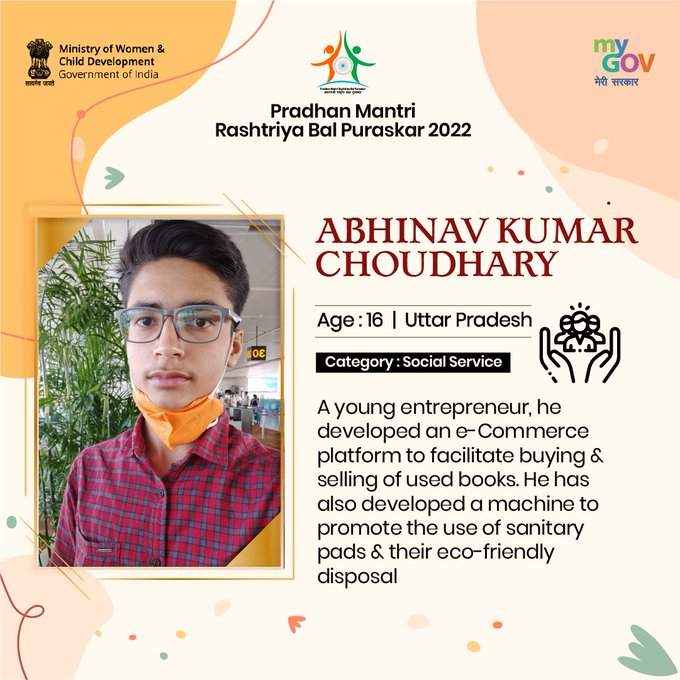

Although the young awardees say they would have no laurels without the support of their families and mentors, they are beyond doubt, stars in their own right. As the PM rightly emphasised, “for doing good, age is not a barrier. Youngsters have the potential to transform society for the better.”
(With inputs from Charu Thakur)
